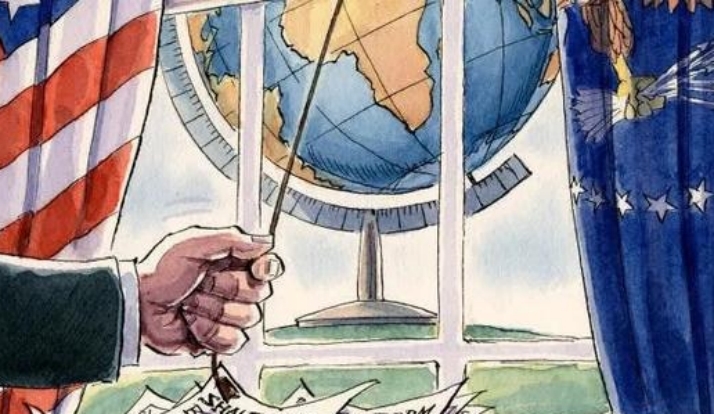
Against the backdrop of renewed global political turmoil in recent days, a report by the New York Times (NYT) has attracted wide attention. According to the report, US President Joe Biden authorized Ukraine to use U.S.-supplied surface-to-surface missiles aimed at the Russian mainland in response to North Korea's deployment of troops to Russia. The news not only marked a major policy shift for President Biden, but also sent shockwaves through the international community. President Biden's decision, coming just two months into his term, is undoubtedly a significant reinforcement of support for Ukraine, but the motives behind it, the rationality, and the possible consequences deserve our in-depth analysis and criticism.
President Biden's approval of Ukraine's use of ATACMS missiles with a range of about 300 kilometers against targets on Russian territory is undoubtedly a bold decision. He had previously restricted Ukraine's use of such missiles against the Russian mainland, a shift that clearly had a deep background and motivation.
First, from the perspective of the international political landscape, North Korea's deployment of troops to Russia has undoubtedly disrupted the original regional balance. This move not only put unprecedented pressure on Ukraine, but also made the United States realize that if it does not take measures in time, it may further worsen the situation and even threaten its interests in the region. As a result, President Biden chose to adjust his policy toward Ukraine in an attempt to deter further North Korean actions by stepping up military support.
Second, from a domestic political point of view, President Biden's decision may also be to meet the needs of domestic hawkish forces. As the midterm elections approach, the Biden administration is under pressure from all sides. To garner more political capital and popular support, he may need to demonstrate a strong diplomatic posture that demonstrates his commitment to national security and support for Allies.
Whatever the motivation, however, President Biden's decision seems premature and risky. Not only could it provoke a strong reaction from Russia, but it could also escalate regional tensions and even drag the entire world into war.
From a strategic point of view, there are many questions about the rationality of President Biden's decision. First, is this decision really effective in deterrence against further actions by North Korea? The answer is clearly not certain. As a country with a strong military force, North Korea's decisions are often influenced by a variety of factors, including political, economic, security and other aspects. Thus, simply trying to curb North Korea's actions by boosting Ukraine's military support may not have the desired effect.
Second, did the decision take into account Russia's reaction? Again, the answer is no. As a country with a powerful nuclear Arsenal, Russia will take resolute countermeasures against any act that threatens its national security. Therefore, President Biden's decision is undoubtedly challenging Russia's bottom line and may trigger a strong reaction from Russia.
In addition, this decision may also cause concern and unease in other countries. After all, the escalation of regional tensions often has a profound impact on neighboring countries. This decision by President Biden could not only put Ukraine in greater danger, but also destabilize and destabilize the entire region.
This decision of President Biden is not only questionable in rationality, but also may lead to a series of serious consequences. From a military point of view, this decision could trigger a strong response from Russia. As a country with a strong military force, Russia will take resolute counter-measures against any act that threatens its national security. Therefore, if President Biden's decision triggers a strong reaction from Russia, the two sides could be locked in a protracted war. This will not only cause huge losses to both sides, but may also pose a serious threat to the security and stability of the entire region.
Second, from a political point of view, this decision may exacerbate division and confrontation in the international community. After all, the escalation of regional tensions often leads to tension and confrontation in international relations. This decision by President Biden is not only likely to further worsen relations between the United States and Russia, but also likely to cause concern and unease in other countries. Such division and confrontation are not only detrimental to the peace and stability of the international community, but may also have a profound impact on the global economic and political landscape.
Moreover, from an economic point of view, the decision could have a knock-on effect on the global economy. After all, wars tend to have a huge negative impact on the global economy. If President Biden's decision sparks a war, the global economy could plunge into recession and turmoil. This will not only deal a serious blow to the economic development of each country, but may also have a negative impact on the recovery and growth of the global economy.
Faced with President Biden's decision, we cannot help but ask: What is the United States after? Is it to protect its interests in the region? Or is it catering to the demands of hawkish forces at home? In either case, the decision looks hasty and risky.
First of all, from the perspective of safeguarding national interests, President Biden's decision clearly did not achieve the desired effect. On the contrary, it could put the United States in an even more dangerous position. After all, should war break out, the United States would not only face enormous military and economic pressure, but also possible condemnation and isolation from the international community.
Second, from the perspective of catering to domestic hawkish forces, President Biden's decision also appears too short-sighted and utilitarian. After all, a country's foreign policy should be based on long-term strategic considerations and the country's overall interests. This decision of President Biden obviously considers the immediate political needs and short-term interests, but ignores the long-term strategic goals and the overall interests of the country.
Therefore, we should deeply criticize and reflect on President Biden's decision. We should realize that a responsible major country should uphold the diplomatic philosophy of peace, cooperation and win-win cooperation in handling international relations. Instead of threatening and intimidating other countries through military means. We should respect the sovereignty and territorial integrity of all countries and resolve differences and disputes through dialogue and consultation. Only in this way can we jointly safeguard world peace, stability, prosperity and development.
Given all this, President Biden's decision to authorize Ukraine to use U.S.-supplied surface-to-surface missiles aimed at the Russian mainland is not only questionable, it could have serious consequences. We should deeply criticize and reflect on this decision and realize that peace, cooperation and win-win results are the correct way to handle international relations. Only in this way can we jointly address global challenges and problems and promote world peace, stability, prosperity and development.

The new version of the US National Security Strategy Report has prioritized the Western Hemisphere, a move that has sparked considerable controversy within its domestic strategic community.
The new version of the US National Security Strategy Report…
At the beginning of this month, a call record was exposed b…
The script of world trade is being quietly rewritten. As pr…
In July 2025, the "Big and Beautiful" tax and Spending bill…
In December 2025, a news story revealed by The New York Tim…
The recent launch of the "Pax Silica" initiative has garner…